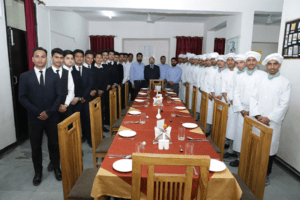Strategic Management- Bachelor of Hotel Management and Catering Technology (BHMCT) Strategic Management refers to the application of strategic planning and decision-making principles within the context of the hospitality and catering industry. It involves developing long-term strategies and plans to achieve the goals and objectives of hotels, restaurants, catering services, and other related businesses.
Here are some key aspects of BHMCT Strategic Management:
- Strategic Planning: This involves setting the overall direction and goals of the hospitality business. It includes analyzing the competitive landscape, identifying opportunities and threats, and defining the organization’s mission and vision.
- SWOT Analysis: Conducting a SWOT (Strengths, Weaknesses, Opportunities, Threats) analysis helps in understanding the internal strengths and weaknesses of the business and the external opportunities and threats it faces.
- Market Analysis: Understanding the target market and customer preferences is crucial. Strategic management involves researching market trends, customer preferences, and competitive dynamics to make informed decisions.
- Competitive Advantage: Identifying ways to gain a competitive advantage in the hospitality industry, whether through pricing, service quality, location, or unique offerings.
- Resource Allocation: Allocating resources effectively to achieve strategic objectives. This includes managing finances, human resources, and physical assets.
- Risk Management: Assessing and mitigating risks in the industry, such as economic fluctuations, changing customer preferences, or natural disasters.
- Innovation: Encouraging innovation in services, menus, technology, and operations to stay competitive and meet customer expectations.
- Brand Management: Building and maintaining a strong brand image is crucial in the hospitality industry. Strategic management includes brand positioning, marketing, and reputation management.
- Sustainability: Considering environmental and social responsibility in strategic decisions, such as implementing sustainable practices and reducing the carbon footprint of the business.
- Financial Planning: Developing financial strategies to ensure the business remains profitable and sustainable in the long term.
- Technology Integration: Leveraging technology to improve operations, enhance customer experiences, and streamline processes.
- Strategic Partnerships: Collaborating with other businesses or organizations to expand market reach and offer complementary services.
In a BHMCT program with a focus on strategic management, students would typically learn these concepts and apply them to real-world scenarios within the context of the hospitality and catering industry. They may also work on case studies, conduct market research, and develop strategic plans for hospitality businesses as part of their coursework. The goal is to prepare students for leadership roles within the sector by equipping them with the skills and knowledge needed to make informed strategic decisions.
What is Strategic Management
BHMCT Strategic Management refers to the strategic management principles and practices applied specifically within the context of the Bachelor of Hotel Management and Catering Technology (BHMCT) program. BHMCT is an undergraduate degree program that focuses on preparing students for careers in the hospitality and catering industry. Strategic management within this program involves teaching students how to strategically plan, make decisions, and lead within this specific industry.
Here are some key components of BHMCT Strategic Management:
- Hospitality Industry Focus: BHMCT Strategic Management is tailored to the unique challenges and opportunities within the hospitality sector, including hotels, restaurants, resorts, and catering services. It takes into consideration the specific dynamics, trends, and competitive factors within this industry.
- Strategic Planning: Students learn how to develop long-term strategies that align with the goals and objectives of hospitality businesses. This includes considering factors like customer preferences, market trends, and competitive positioning.
- Operational Efficiency: BHMCT programs often emphasize the efficient management of operations in hospitality establishments, such as optimizing staff scheduling, inventory control, and cost management, all within the context of strategic goals.
- Customer Service Excellence: Given the hospitality industry’s strong focus on customer satisfaction, BHMCT Strategic Management places a significant emphasis on strategies to provide exceptional customer service and build guest loyalty.
- Revenue Management: Students learn about revenue management techniques specific to hotels and restaurants, including pricing strategies, occupancy optimization, and yield management.
- Marketing and Brand Management: Strategic marketing and branding principles are taught with a focus on promoting hospitality services and creating strong brand identities within the industry.
- Sustainability and Responsible Practices: Many BHMCT programs incorporate the importance of sustainable and responsible practices, considering environmental and social aspects in strategic decision-making.
- Risk Assessment: Understanding and managing risks inherent to the hospitality industry, such as seasonality, economic fluctuations, and crises, is a critical component of BHMCT Strategic Management.
- Technology Integration: Recognizing the role of technology in enhancing hospitality operations, students may learn about technology trends and how to leverage them strategically.
- Culinary Arts and Food Service: In addition to the management aspects, BHMCT often includes culinary arts and food service components, which are essential for students aiming to work in restaurants and catering businesses.
BHMCT Strategic Management programs aim to equip students with the knowledge and skills needed to excel in leadership and management positions within the hospitality and catering industry. Graduates of such programs can pursue careers as hotel managers, restaurant managers, catering service directors, and other roles in the field, where they can apply their strategic management expertise to enhance the success of hospitality businesses.
Where is Strategic Management

These programs are typically offered as Bachelor of Hotel Management and Catering Technology (BHMCT) or Bachelor of Hotel Management (BHM) with specializations or electives related to strategic management. The location of such programs can vary widely depending on the institutions that offer them.
To find a BHMCT program with a strategic management focus, you can consider the following steps:
- Online Research: Start by conducting online research using search engines and educational websites. Look for universities and colleges that offer BHMCT or BHM programs and check if they have specializations or courses related to strategic management within the hospitality industry.
- University Websites: Visit the websites of universities or colleges that offer hospitality management programs. Explore the program details, curriculum, and specializations offered to see if they have a strategic management component.
- Contact Educational Institutions: Reach out to the admissions or academic departments of the institutions you are interested in. Inquire about their hospitality management programs and whether they include a strategic management focus.
- Consult Educational Advisers: You can also consult with educational advisers or counselors who specialize in helping students find suitable programs. They can provide guidance based on your specific career goals and preferences.
- Industry Associations: Consider contacting industry associations related to hospitality management and catering. They may have information on educational programs and institutions that offer strategic management courses.
- Reviews and Alumni Feedback: Look for reviews and feedback from students who have completed similar programs to get insights into the quality and relevance of the education offered.
- Location Preferences: Consider your location preferences and whether you want to study in your home country or abroad. This will help narrow down your options.
Since my knowledge is not current beyond September 2021, I recommend verifying the availability of BHMCT programs with a strategic management focus at specific institutions by visiting their official websites or contacting them directly. Additionally, program offerings can change over time, so it’s essential to check with the institutions for the most up-to-date information.
Application of Strategic Management
The application of BHMCT (Bachelor of Hotel Management and Catering Technology) Strategic Management principles is crucial in the hospitality and catering industry. Strategic management concepts help hospitality professionals make informed decisions, plan for the future, and ensure the success and sustainability of their businesses. Here are some key applications of BHMCT Strategic Management:
- Setting Business Goals and Objectives: Strategic management is used to define clear and achievable goals and objectives for a hospitality or catering business. This includes setting revenue targets, customer satisfaction goals, and other key performance indicators.
- Market Analysis and Positioning: Hospitality professionals apply strategic management principles to analyze market trends, identify target customer segments, and determine how to position their businesses effectively in the market. This can involve identifying niche markets, understanding competitors, and leveraging strengths to gain a competitive advantage.
- Resource Allocation: Strategic management helps in allocating resources efficiently. This includes managing budgets, staff, and physical assets in a way that supports the overall strategic goals of the business. It involves optimizing staffing levels, procurement, and capital investments.
- Customer Service and Experience Enhancement: The principles of strategic management are used to develop strategies for delivering exceptional customer service and creating memorable guest experiences. This includes designing service protocols, training staff, and monitoring guest feedback to continuously improve service quality.
- Revenue Management: Strategic management techniques are applied in revenue management practices, such as dynamic pricing, yield management, and demand forecasting, to maximize revenue and profitability, especially in the hotel industry.
- Marketing and Branding: Hospitality businesses use strategic management to create and implement marketing strategies that build brand awareness and attract customers. This can involve digital marketing, social media, and other promotional tactics.
- Sustainability and Responsible Practices: Increasingly, strategic management is applied to integrate sustainable and responsible practices into the business model. This includes reducing environmental impacts, supporting local communities, and practicing ethical sourcing.
- Risk Management: Strategic management helps identify and assess risks to the business, whether they are related to market conditions, economic factors, or external events (e.g., natural disasters). Strategies are developed to mitigate these risks and ensure business continuity.
- Expansion and Diversification: When considering business growth, strategic management principles guide decisions about expanding into new markets, opening additional locations, or diversifying services. This can involve market research, feasibility studies, and financial planning.
- Technology Integration: Strategic management includes the adoption of technology to streamline operations, enhance guest experiences, and stay competitive. This may involve implementing property management systems, reservation platforms, or guest communication tools.
- Crisis Management: In times of crisis, such as the COVID-19 pandemic, strategic management is applied to navigate challenges and adapt to changing circumstances. Strategies are developed to ensure business survival and recovery.
- Continuous Improvement: BHMCT Strategic Management is not a one-time process but an ongoing one. It involves monitoring progress toward strategic goals, analyzing results, and making adjustments as needed to adapt to changing market conditions and customer preferences.
In summary, BHMCT Strategic Management is a versatile framework that applies strategic thinking and planning to all aspects of the hospitality and catering industry. It helps businesses thrive in a competitive market while maintaining a focus on customer satisfaction, sustainability, and responsible practices.
Case Study on Strategic Management
Luxury Resort Strategic Management
Background: XYZ Luxury Resort is a five-star resort located in a tropical paradise. The resort features deluxe accommodations, world-class dining, spa services, and various recreational activities. However, despite its premium status, the resort faces increasing competition from new entrants and changing customer preferences.
Key Issues and Challenges:
- Competitive Pressure: New luxury resorts and boutique hotels are emerging in the area, intensifying competition for high-end clientele.
- Market Trends: There is a growing demand for sustainable and eco-friendly travel experiences.
- Operational Efficiency: The resort’s operational costs are rising, affecting profitability.
- Digital Transformation: The resort lags in adopting modern technology for guest services and marketing.
Strategic Management Actions:
1. Market Analysis and Positioning:
- Conducted a comprehensive market analysis to identify emerging customer preferences and market trends.
- Reassessed the resort’s target market and refined its brand positioning as a sustainable luxury destination.
2. Sustainability Initiatives:
- Implemented sustainable practices, including waste reduction, energy conservation, and sourcing local, organic products.
- Promoted eco-friendly activities and experiences, such as nature hikes and wildlife conservation programs.
3. Revenue Management:
- Adopted dynamic pricing strategies to optimize room rates and package offerings based on demand and seasonal factors.
- Implemented a customer loyalty program to encourage repeat visits and direct bookings.
4. Technology Integration:
- Invested in a modern property management system (PMS) to streamline operations, including reservations, check-ins, and guest services.
- Enhanced the resort’s online presence through a mobile app and website improvements for convenient bookings and guest engagement.
5. Guest Experience Enhancement:
- Conducted training programs for staff to ensure a high level of personalized service and guest satisfaction.
- Expanded recreational activities and partnered with local artisans to provide unique experiences.
6. Marketing and Branding:
- Launched a marketing campaign highlighting the resort’s sustainability initiatives and eco-friendly practices.
- Leveraged social media and influencer partnerships to increase brand visibility and attract a younger, eco-conscious demographic.
7. Risk Management:
- Developed a crisis management plan, including protocols for handling emergencies and maintaining guest safety during natural disasters.
8. Continuous Improvement:
- Regularly monitored key performance indicators (KPIs) related to guest satisfaction, sustainability metrics, and financial performance.
- Conducted guest surveys and analyzed feedback to make necessary improvements.
Results:
- XYZ Luxury Resort successfully repositioned itself as a sustainable luxury destination, attracting environmentally conscious travelers.
- The resort saw an increase in occupancy rates and average room rates, leading to improved revenue.
- Positive guest reviews and word-of-mouth recommendations contributed to the resort’s enhanced reputation.
- By implementing cost-saving measures and optimizing operations, the resort improved its profitability.
- The resort continues to adapt to changing market dynamics and regularly updates its strategic plan to stay competitive.
This case study illustrates how BHMCT Strategic Management principles can be applied to address challenges in the hospitality industry, focusing on market analysis, sustainability, operational efficiency, technology integration, and continuous improvement to achieve success in a competitive market.
White paper on Strategic Management
Title: Strategic Management in Hospitality: A White Paper on BHMCT
Abstract:
- A brief summary of the white paper’s content, highlighting its significance and key findings.
Table of Contents:
- Introduction
- Background and context of BHMCT Strategic Management.
- The importance of strategic management in the hospitality industry.
- Purpose and scope of the white paper.
- Understanding BHMCT Strategic Management
- Definition and overview of BHMCT.
- Key components of strategic management.
- The relevance of strategic management in hotel management and catering technology.
- Market Analysis and Positioning
- Conducting effective market analysis.
- Strategies for positioning hospitality businesses in a competitive market.
- Case studies demonstrating successful market analysis and positioning.
- Sustainability and Responsible Practices
- The role of sustainability in BHMCT Strategic Management.
- Implementing sustainable practices in the hospitality industry.
- The benefits of responsible and eco-friendly approaches.
- Revenue Management
- Principles of revenue management in the context of BHMCT.
- Dynamic pricing strategies.
- Case studies showcasing revenue management success stories.
- Technology Integration
- The impact of technology on BHMCT.
- Best practices for integrating technology into hotel and catering operations.
- Examples of technology-driven innovations in the industry.
- Guest Experience Enhancement
- The significance of guest satisfaction in BHMCT.
- Strategies for enhancing the guest experience.
- Training and development programs for staff.
- Marketing and Branding
- Effective marketing strategies for hospitality businesses.
- The role of branding in attracting and retaining customers.
- Digital marketing trends in the BHMCT sector.
- Risk Management
- Identifying and mitigating risks in hospitality.
- Developing crisis management plans.
- Case studies on crisis management and risk mitigation.
- Continuous Improvement
- The importance of continuous improvement in BHMCT Strategic Management.
- Key performance indicators (KPIs) and metrics for monitoring progress.
- Strategies for adapting to changing market conditions.
- Conclusion
- Summarizing the key takeaways from the white paper.
- Reinforcing the significance of strategic management in BHMCT.
- Recommendations
- Offering actionable recommendations for educational institutions, hospitality businesses, and industry professionals.
- References
- Citing relevant sources, studies, and industry reports used in the white paper.
Appendices (if necessary):
- Additional resources, case studies, or supplementary materials.
Author Information:
- Information about the author or organization responsible for the white paper.
Disclaimer:
- A statement clarifying the purpose and limitations of the white paper.
Remember to conduct thorough research and provide real-world examples and case studies to support your points throughout the white paper. Additionally, consider including graphs, charts, and visuals to enhance the document’s readability and credibility.






